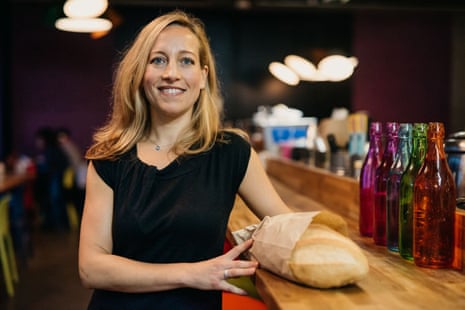“Most people are surprised to learn that half of all food waste occurs in the home, compared to less than 5% at the retail level,” says Saasha Celestial-One, the US born co-founder of British food-sharing app, Olio. “The average family throws away £800 of food each year that could’ve been eaten. Collectively that adds up to £15bn per year.
“Adding insult to injury, we have 8.4 million people living in food poverty in the UK.”
Celestial-One and her business partner Tessa Clarke started Olio in 2015, and it has grown from a local initiative in north London to a company with a presence in 46 countries and more than 900,000 users.
The premise is simple: users snap a picture of their food items that would otherwise go to waste, and add them to Olio. Neighbours then receive customised alerts and can request anything that takes their fancy. Pick-up is arranged via private messaging within the app. According to Olio, 50% of all food listings added to the app are requested in less than two hours.
Celestial-One and Clarke met during their MBAs at Stanford Graduate School of Business in 2002. Both grew up in farming families: Clarke, a farmer’s daughter, saw a third of her family’s work discarded daily, and had the idea for Olio when moving back to the UK from Switzerland and was unable to find anyone to give her surplus food to.
Celestial-One was raised in rural Iowa as the eldest of six siblings by what she calls “hippy entrepreneurs”. Her second name – Celestial-One – is her legal name, and was made up by her parents, who drummed into their children not to let things go to waste from a very early age.
“My mother had to be incredibly resourceful in order to make ends meet, and I have memories of accompanying her on scavenging missions around town. We’d go to homes that were being torn down, and collect wood, toilet fixtures – anything of value that could be used again or sold on.”
Right before she was born, her parents started their own company selling bulk herbs and spices to their friends and families. Eventually that company would become successful, but for the first half of her childhood she says she “felt poor”, with new clothing or toys the very rare exception.
She eventually headed to business school before a 13-year career working at global corporations such as Morgan Stanley, McKinsey and American Express.
But she was now a world away from her hippy roots – it distressed her mother so much she cried when she got her first job at an investment bank.
And then, in 2005, Celestial-One’s boyfriend at the time was accepted to Cambridge. The couple decided to move to the UK together.
Neither Clarke nor Celestial-One have a background in mobile app tech. “We’ve been lucky to find experts in tech who believe in our mission who have helped us to build the apps,” Celestial-One explains, “and we also have an exceptional in-house team of developers, too. They started the company with £40k pooled from their life savings.
“What makes Olio work is the growing community of users, volunteers, and more than 300 businesses that donate food each week.”
In December, Olio received the climate action award at the UN climate change conference in Poland, in recognition of its potential at scale to help mitigate the effects of climate change.
The app’s growing success has been accompanied by a change in social attitudes, she continues. “Since we started Olio there has been a tangible shift with regard to public and political awareness of the unsustainable problem of food waste.
“Plastic has also been very much in the spotlight, and the message that small actions can lead to big change seems to be resonating with consumers more, as people look to lead more sustainable lifestyles.”
However, critics argue that a simple app can’t do much about a problem of such scale. The issue of food waste is truly gargantuan and getting worse all the time, with 66 tonnes thrown away every second and predicted to increase by a third by 2030. Household food waste is one thing, but there is also considerable wastage in food manufacturing and the hospitality sector. It’s estimated that each year in the UK 1 billion plates of food are wasted across its restaurants, pubs, hotels and quick service eateries.
Also, by its nature – needing a good number of users to work, and requiring them to be able to travel easily to each other – Olio is limited to cities, although Celestial-One says it’s starting to take off in smaller towns.
But investors remain interested in the project. So far the company has raised £6.25m from angels, venture capitalists and impact investors. And they will be going to market in early 2020 for funding to help further expand outside of the UK.
Celestial-One adds: “We have successfully seen 1.2m portions of food shared between neighbours through the Olio app.
“Mass consumer behaviour change is possible, and the cynics are usually the ones who reluctantly acknowledge it only in hindsight.”
She adds that, unlike with her banking career, her mum is now proud of what she does. “In many ways Olio has helped me to come full circle, back to my roots and the values I was raised with.”
